This week we’ve found a crazy amount of phishing scams that you need to watch out for, including ones relating to AT&T, Netflix, Amazon, NHS, NFTs, Trust Wallet, and Meta Token. Would you be able to spot all the scams?
Phishing scams sure are one of the scammers’ favorite weapons! Conventionally, while impersonating famous brands, they send out fake text messages and emails containing phishing links with the aim of enticing you into opening them with promises of “prizes” or “discounts.”
Most commonly, these links lead to online survey pages that state you can claim a gift by filling out an online questionnaire. After that, you are prompted to enter credit card numbers before your “gift” can be delivered. In other instances, the links take you to fake log-in pages that seem to belong to various brands. These pages require you to submit log-in credentials to check a package’s delivery status, change account settings, or whatever other tasks the scammers have asked you to complete.
Their ultimate goal is to steal your personal information — they’ll record everything you enter on these fake pages and use it to commit cybercrimes: e.g., hack into your bank account or steal your identity. Don’t let them! Read on to check out the hottest scams of the week:
1. AT&T Voucher Scam
Fake AT&T text messages have been circulating for weeks, and now a new version saying you’ve missed a $250 voucher has appeared:
- ATT: Hi! Your $250 voucher has been returned 2 times already, 1 last return and it will be void. Claim here
The attached link will take you to a fake AT&T online survey page that promises you a free “Smart Health Watch”:
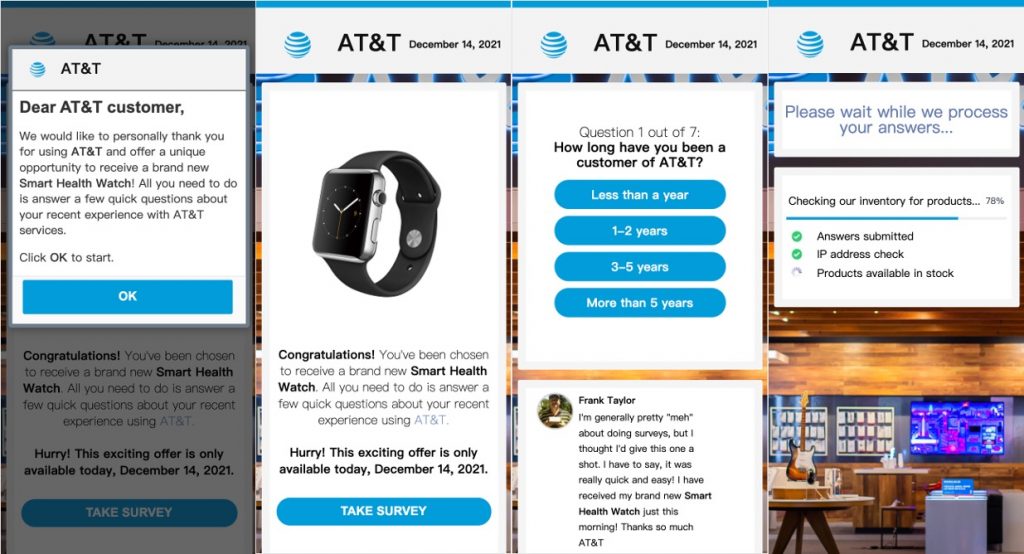
You will be asked to enter credit card information. (Of course, don’t do so!)
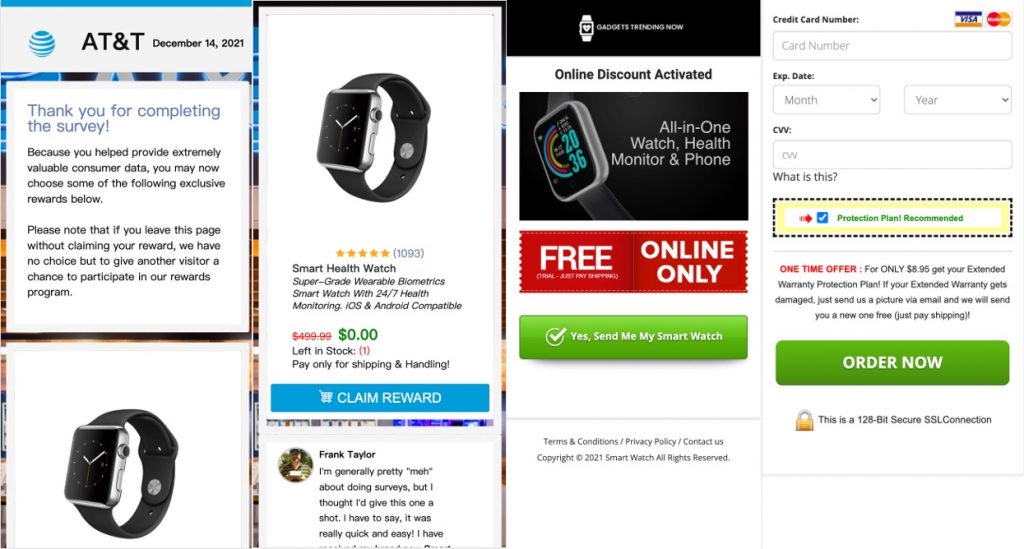
Browse the web safely with Trend Micro ScamCheck (it’s free!)

ScamCheck is an all-in-one browser extension for detecting scams, phishing attacks, malware, and dangerous links – and it’s FREE!
After you’ve pinned ScamCheck, it will block dangerous sites automatically! It is now available on Safari, Google Chrome, and Microsoft Edge.
Check out this page for more information on ScamCheck.
2. Netflix Survey Scam
Last week we wrote about Netflix phishing text messages, and now we’ve spotted another Netflix phishing scam, although this one happens via email. This particular scam falsely claims you can win a “Netflix offer” by completing an online survey:

You already know what will happen. As we’ve emphasized many times, don’t click on anything from unknown sources!
3. Fake NHS Email Scam (COVID-19 Passport)
Ever since the pandemic exploded, scams about vaccines, vaccine passports, and any COVID-related issues have been annoyingly persistent. We’ve reported on fake National Health Service (NHS) emails before, and the scammers are up to their usual tricks again! This time they pretend to be offering you a new COVID-19 passport for 2022 and ask you to visit the embedded link to get it:
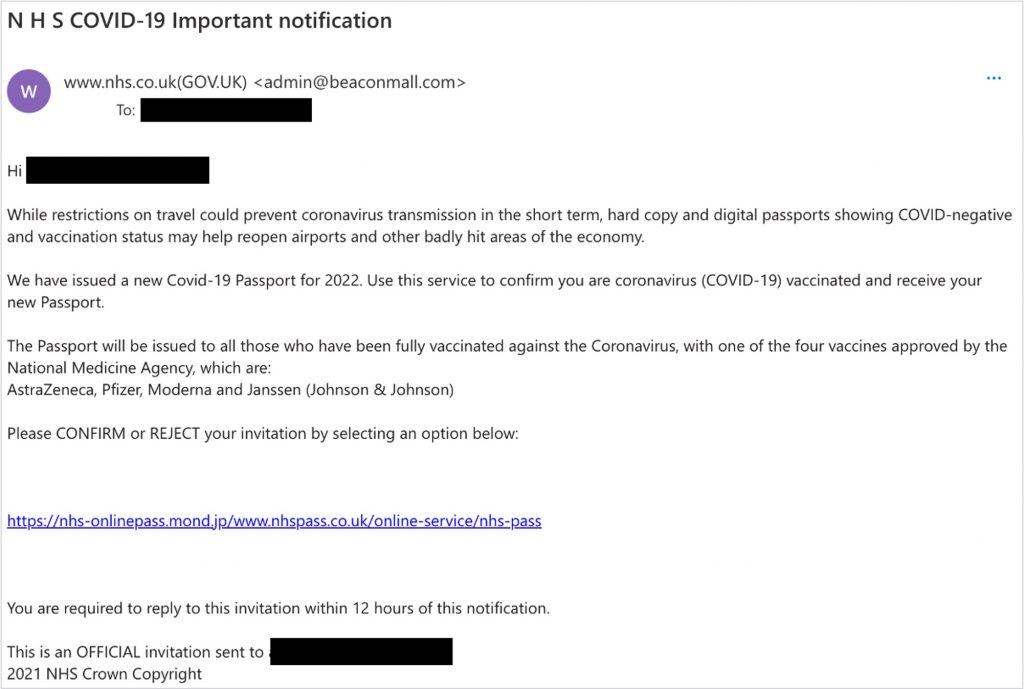
If you follow the instructions, you’ll be taken to a fake NHS log-in page where you could end up exposing your personal credentials. Be careful!
4. Cryptocurrency Scams
Because the popularity of NFTs (non-fungible tokens) has dramatically increased recently, there are more cryptocurrency scams in circulation than ever before. This week we spotted three ongoing crypto scams:
Trust Wallet Phishing Email
Which digital crypto wallet do you use? Mimicking fake MetaMask security alert emails, this Trust Wallet phishing scam has been widely circulating recently:
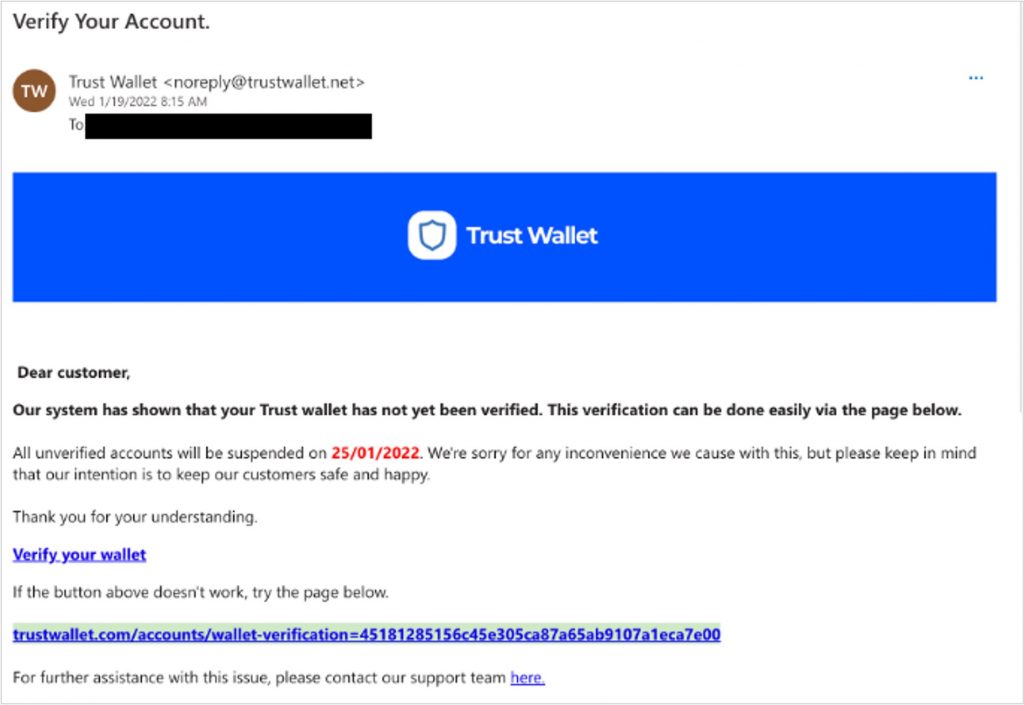
Scammers claim you have to verify your Trust Wallet via the attached link, but make no mistake about it, it is a phishing link that takes you to a fake Trust Wallet website.
Fake Trust Wallet Website
tursmetveri[.]com
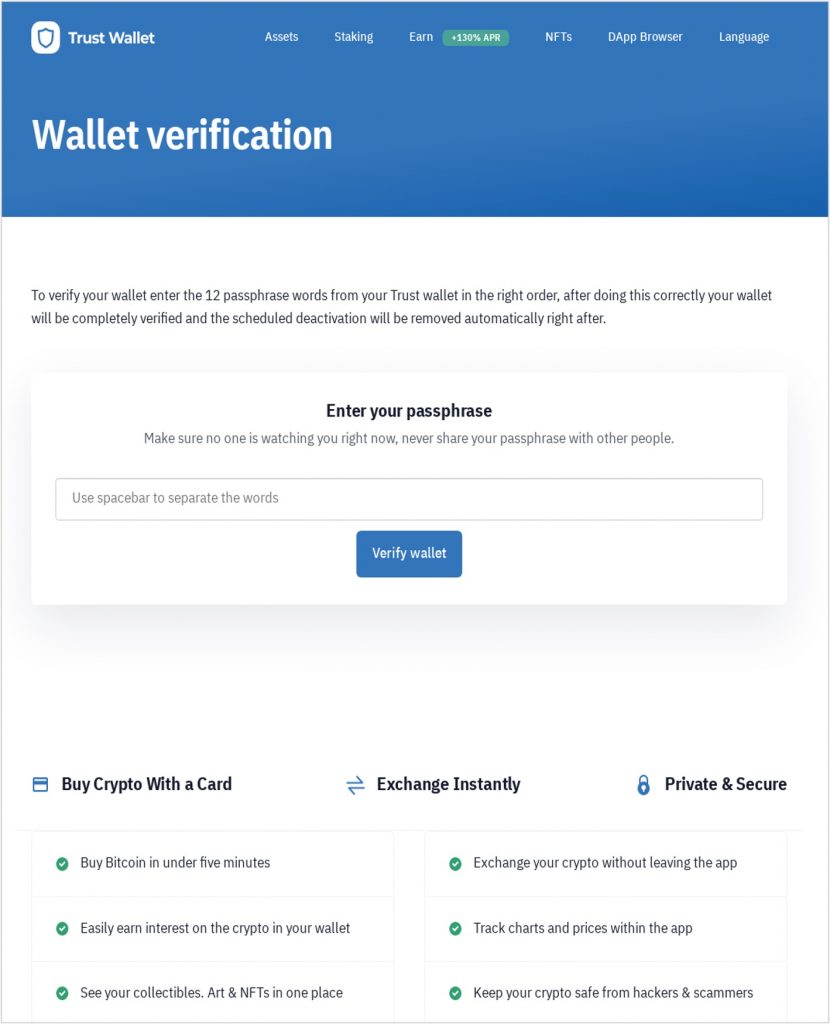
Real Trust Wallet Website
trustwallet[.]com

Note: The fake Trust Wallet website looks quite similar to the legitimate one. Please take a look at the web address carefully – the genuine domain of Trust Wallet is trustwallet.com!
If you submit your recovery phrase here, scammers can hack into your Trust Wallet and transfer every “bit” away. What’s worse, since cryptocurrencies are decentralized, it would be nearly impossible to get them back! Watch out!
Fake Crypto Token Websites
There are tens of thousands of crypto tokens now available for the Metaverse, but are you sure the one you’re eyeing up is legitimate? Beware! We’ve found several fake cases this week:
#1 Meta Token

Fake website: metatokens[.]financial
#2 NFT

don’t forget to join our nft – alphawhalefund[.]com/ – active members will be whitelisted, our partners last project had 15x returns!
For more tips about avoiding NFT scams, check out this article.
5. Amazon Phishing Scams
To put it simply, we’ve seen WAY too many fake Amazon text messages/emails recently. Scammers pretend there is an issue with the delivery of a package you ordered or that you need to check an order’s status to try to trick you into clicking on their phishing links:
Package SMS Scam
- Arriving today: your Amazon package. More info at <URL>
If you click on the attached link, it will take you to an online survey page featuring an iPhone 12 Pro as a reward:
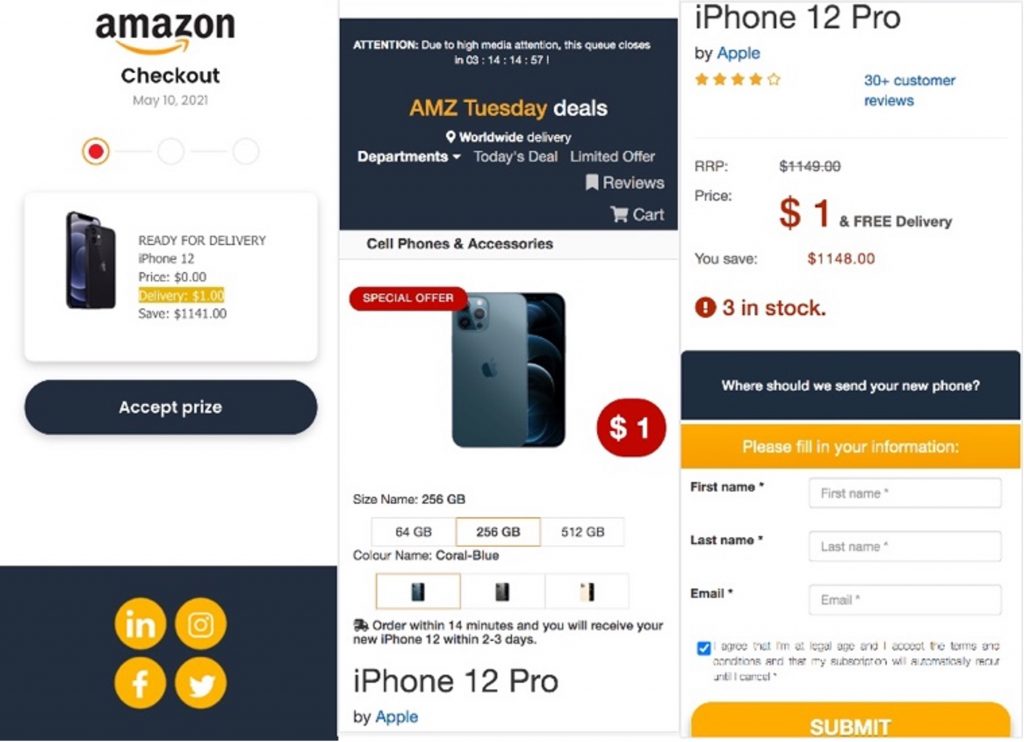
Again, this is a phishing page – all the credentials you submit will end up in the scammers’ hands!
“Order Accepted” Email Scam
Got an email saying that your Amazon order is accepted? Don’t click on anything! Scammers have been posing as Amazon and sending fake order confirmation emails, prompting people to click on the attached phishing links. Don’t fall for it!
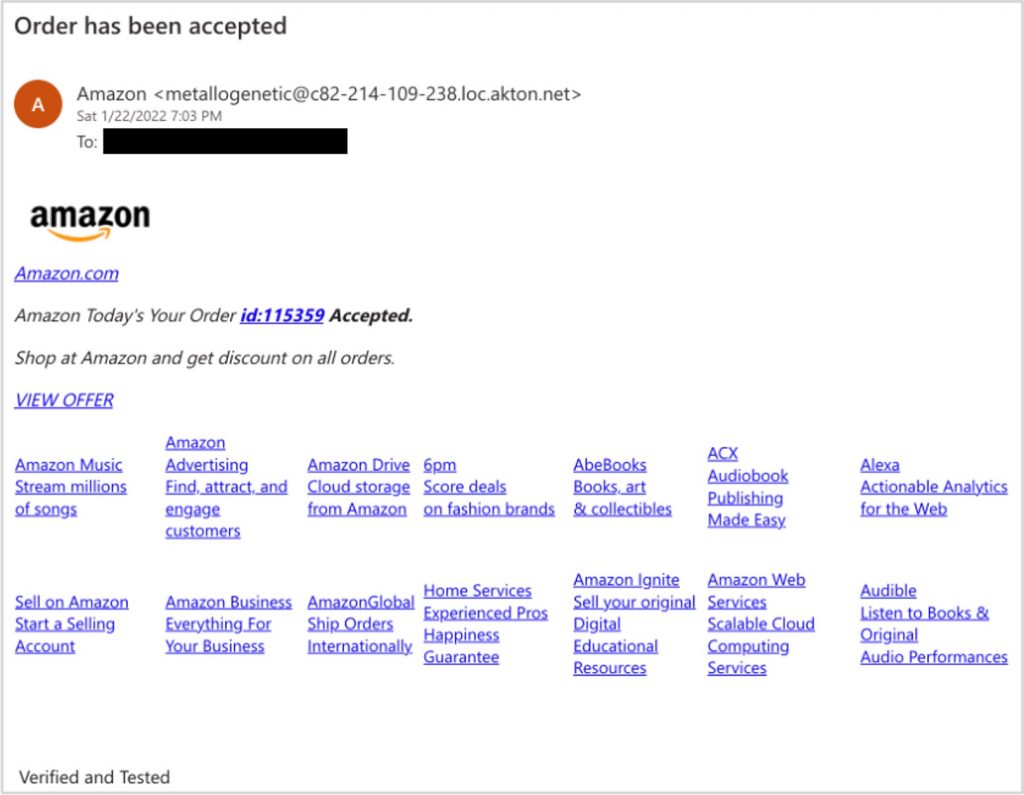
How to Protect Yourself
- Double-check the sender’s mobile number/email address.
- Free gifts or prizes are always a major red flag.
- Always go to the official website/application instead of using links from unknown sources.
- Use Trend Micro ScamCheck to surf the web safely (it’s free!)
- Add an extra layer of protection to your device with Trend Micro Maximum Security. Its Web Threat Protection, Ransomware Protection, Anti-phishing, and Anti-spam Protection can help you combat scams and cyberattacks. Click the button below to give it a try:
As ever, if you’ve found this article an interesting and/or helpful read, please do SHARE it with friends and family to help keep the online community secure and protected.
